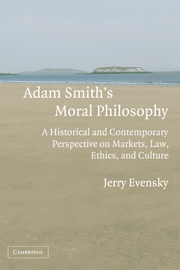 Adam Smith's Moral Philosophy
Adam Smith's Moral Philosophy Book contents
- Frontmatter
- Contents
- Preface
- Adam Smith's Moral Philosophy
- PART ONE ON ADAM SMITH'S MORAL PHILOSOPHICAL VISION
- PART TWO ON THE PLACE OF THE WEALTH OF NATIONS IN ADAM SMITH'S MORAL PHILOSOPHICAL VISION
- 5 On the Progress of Opulence, Setting the Scene in Book I of The Wealth of Nations
- 6 The Role of Capital in the Progress of Opulence: The Analysis of Book II of The Wealth of Nations
- 7 An Unnatural Path to Natural Progress: Smith Represents the Power of His Principles in Book III of The Wealth of Nations
- 8 Smith on the Mercantile System and the Evolution of His Voice: Book IV of The Wealth of Nations and Part VI of The Theory of Moral Sentiments
- 9 On the Role of Government: Book V of The Wealth of Nations
- PART THREE ON ADAM SMITH'S MORAL PHILOSOPHICAL VISION AND THE MODERN DISCOURSE
- Epilogue: On the Human Prospect
- References
- Index
8 - Smith on the Mercantile System and the Evolution of His Voice: Book IV of The Wealth of Nations and Part VI of The Theory of Moral Sentiments
Published online by Cambridge University Press: 11 November 2009
- Frontmatter
- Contents
- Preface
- Adam Smith's Moral Philosophy
- PART ONE ON ADAM SMITH'S MORAL PHILOSOPHICAL VISION
- PART TWO ON THE PLACE OF THE WEALTH OF NATIONS IN ADAM SMITH'S MORAL PHILOSOPHICAL VISION
- 5 On the Progress of Opulence, Setting the Scene in Book I of The Wealth of Nations
- 6 The Role of Capital in the Progress of Opulence: The Analysis of Book II of The Wealth of Nations
- 7 An Unnatural Path to Natural Progress: Smith Represents the Power of His Principles in Book III of The Wealth of Nations
- 8 Smith on the Mercantile System and the Evolution of His Voice: Book IV of The Wealth of Nations and Part VI of The Theory of Moral Sentiments
- 9 On the Role of Government: Book V of The Wealth of Nations
- PART THREE ON ADAM SMITH'S MORAL PHILOSOPHICAL VISION AND THE MODERN DISCOURSE
- Epilogue: On the Human Prospect
- References
- Index
Summary
By the close of WN Book III, Smith has completed his system and his empirical (historical) case for his system's persuasiveness. However, there were alternative systems available, and in WN Book IV, “Of Systems of political Oeconomy,” Smith addresses his competition.
The competitors he identifies are the “agricultural systems” (WN, 663) of the Physiocrats and the “mercantile System” (WN, 429). Smith makes the case that both of these are less persuasive than his model, but in one very important respect, he sees these two systems very differently. Although he disagrees with the Physiocrats, he admires and respects them as noble philosophers. In contrast, he sees the contemporary advocates of the mercantile system as selfish rogues who have captured and reshaped a philosophical enterprise in order to advocate policies that line their own pockets under the guise of philosophy.
This misuse of philosophy galls Smith doubly. First, having prevailed in the Parliament, the mercantile interests have led Britain down a path that he fears is very self-destructive. This concerns Smith, the policy person, deeply. Second, by presenting themselves as bearing the mantle of a philosophy concerned only for the well-being of the state, the mercantile interests have invaded and sullied Smith's own beloved realm: philosophy.
There are nine chapters in the final version of WN Book IV. Eight cover the mercantile system. Only one is dedicated to the agricultural system.
- Type
- Chapter
- Information
- Adam Smith's Moral PhilosophyA Historical and Contemporary Perspective on Markets, Law, Ethics, and Culture, pp. 182 - 212Publisher: Cambridge University PressPrint publication year: 2005


